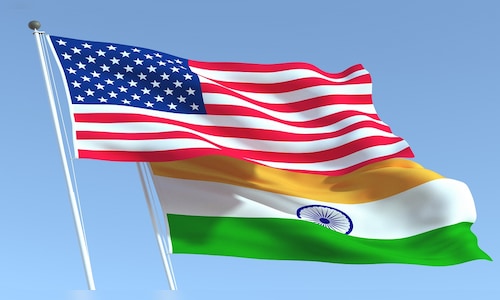Avolta’s revamped retail and F&B offer at Barcelona Airport in Spain.
Latin America was the standout region for Avolta for all the wrong reasons, following the travel retailer’s reveal of its 2024 annual results on Wednesday. Like-for-like* sales in Latin America (including the Caribbean) were down by 4.7% in sharp contrast to its three other regions which were all up, led by Europe, though the Americas as a whole looks weak in Q1.
Latin markets were offset by the rest of the world—with Avolta’s biggest region of Europe, Middle East and Africa (EMEA) strongly up by 9.4% to Swiss francs 6.93 billion ($7.28 billion). However, the Americas in general—now facing some economic uncertainty thanks to the Trump administration’s flip-flopping on tariffs—might be in for a rough ride, particularly Mexico where Avolta has a strong position, and where last year’s performance was middling.
North America has been a powerhouse region for Avolta in the post-pandemic era. In 2023, sales grew by 14%, but last year they were up by a far more modest 5.4%, reaching Swiss francs 4.3 billion ($4.9 billion) as travel in the United States normalized.
Now it is the core EMEA region—where Avolta has strong positions in airports across the U.K. and Spain, and is expanding in the Middle East—that is in the driving seat. The retailer entered the fast-expanding Saudi Arabia market for the first time last year, and any lasting U.S.-brokered peace deal between Russia and Ukraine could revive the Nordics, the weakest European zone due to war-related air routing restrictions that have impacted Helsinki Airport sales in particular.
Avolta’s regional performance for the full year and final quarter.
Final quarter growth showed EMEA holding steady with 9.5% growth, North America slipping slightly to 4.7%, and Latin America contracting by an alarming 9.6%. Though the region was hampered by comparisons with a strong Argentinian performance in 2023, the country’s continuing currency collapse, added to by a freefalling Brazilian real in Q4 (now in recovery in Q1), may also have affected outbound travel and spending.
Overall, Avolta’s full-year group revenue rose by 6.4% to Swiss francs 13.5 billion ($15.3 billion) with profitability strongly up. Core Ebitda increased by 12% to Swiss francs 1.27 billion ($1.44 billion) with the margin up by 40 basis points to 9.4%, while net debt has been stabilized at around $3 billion, the lowest level for more than a decade according to Avolta’s CFO Yves Gerster.
Lukewarm reception as Americas performance in doubt
Investors were indifferent to the Switzerland-based travel retailer’s pretty solid results for 2024. The shares closed slightly down by 0.8% on Wednesday after rising throughout the day. It was only a late afternoon sell-off that brought a bumpy landing at Swiss francs 37.96 ($43.05). The stock was rising again this morning but over the past month, the stock is down by close to 10%.
Xavier Rossinyol: “Our year-to-date numbers (to February) already include a slowdown in the United … [+]
In Wednesday’s investor call, Avolta CEO Xavier Rossinyol was reluctant to give “too much color” on the Americas and its potential to be a spanner in the works. He was upbeat: “Our year-to-date numbers (to February) already include a slowdown in the United States… but other regions more than compensated for that. Our expectations for the U.S. are better for the second half than the first half. We think there could be an acceleration on the pretty low first two months.”
In a later question he said that the U.S. in these months had been “materially below the average” and had only hit 1-2% growth. That is why he is optimistic for the rest of the year; because sales had hit what he considers a floor from which things could only get better, in theory.
He added that “March is not expected to be a great month” but said that the company’s review of forward bookings and other parameters looked more promising. However, he also commented: “We are prepared for any eventuality by addressing the cost base.” One of these would be staffing levels to ensure a rigorous focus on maintaining margin levels.
U.S. remains attractive within the Americas, but not for Canadians
Avolta has made good headway with new business in the U.S. with three contract wins at John F. Kennedy Airport described as “very material and very fundamental” and could even increase the company’s 33% travel retail market share in the country when these concessions are fully in place.
In the here-and-now, there are early signs that travel to the U.S. has tapered off. Data from seat analyst ForwardKeys show that the top three American airports are all seeing year-over-year declines in international traffic in the current quarter, with Mexico’s Cancun declining in double digits.
Another seat analyst, OAG, confirms a weak Q1 for international seat capacity, with February down to 11.9 million seats versus 2024’s 12.2 million. However, there is an uptick in Q2. OAG’s senior analyst John Grant, told me: “While capacity in the first quarter of this year is pretty flat compared to 2024, that in itself isn’t too bad given Easter slipping into Q2 this year. The more noticeable increase is in the Q2 with 3.5% growth.”
Canadians, fed up with repeatedly being called a 51st U.S. state, and a changing tariff regime, have reined in their American travel plans, with February road trips down by 23%. Meanwhile, the U.S. Travel Association said in a press release that a 10% reduction in Canadian travel could mean two million fewer visits, $2.1 billion in lost spending and 14,000 job losses. The top five most visited states by Canadians—Florida, California, Nevada, New York and Texas—would see declines in retail and hospitality revenue “as shopping is the top leisure activity for Canadian visitors”, said the association.
Canada-U.S. border in Blackpool, Quebec, Canada, on February 2, 2025. Canadian are curtailing their … [+]
Despite the potential travel turbulence, Rossinyol confirmed a like-for-like company growth target of between 5% and 7% this year, with a further margin improvement of 20-40 basis points. To the end of February, growth was 6%. Rossinyol said: “Despite global uncertainties and geopolitical challenges, our diversified presence in more than 70 countries gives us confidence in delivering on our medium-term targets.”
He is also sticking to his long-term multi-pronged vision of what he calls a “travel experience revolution” which is now being supported by an internally-fenced AI tool, Avolta GPT. The retailer is integrating travel retail and food and beverage (F&B) into hybrid concepts—more than 20 were opened in 2024; enhancing cross-selling across categories; and taking membership services to a new level.
The latter objective is happening through the roll out this year of the retailer’s revamped loyalty program, now called Club Avolta which has been popular in the Americas. Unlike its predecessor scheme, it works in all of the company’s 5,000+ locations and uses data to personalize the customer experience. To date, the program has more than 10 million members and accounted for more than 5% of Avolta’s revenue in 2024.
* All percentages shown are like-for-like, not reported, unless stated.







